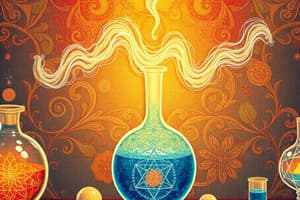Podcast
Questions and Answers
What happens to the bonds in the reactants during a chemical reaction?
What happens to the bonds in the reactants during a chemical reaction?
- They remain unchanged
- They dissolve
- They form new bonds
- They break (correct)
What is the energy required to break a bond called?
What is the energy required to break a bond called?
- Bond strength
- Bond dissociation energy
- Bond formation energy
- Bond energy (correct)
What is the concept that measures the total energy of a chemical system at a given pressure?
What is the concept that measures the total energy of a chemical system at a given pressure?
- Enthalpy (correct)
- Entropy
- Energy
- Bond energy
What type of reaction releases energy because the energy required to break bonds in the reactants is less than the energy released when new bonds form in the products?
What type of reaction releases energy because the energy required to break bonds in the reactants is less than the energy released when new bonds form in the products?
What is the change in enthalpy (ΔH) during a reaction an indication of?
What is the change in enthalpy (ΔH) during a reaction an indication of?
What type of reaction absorbs energy because the energy required to break bonds in the reactants is more than the energy released when new bonds form in the products?
What type of reaction absorbs energy because the energy required to break bonds in the reactants is more than the energy released when new bonds form in the products?
What is the result of the energy required to break bonds in the reactants being less than the energy released when new bonds form in the products?
What is the result of the energy required to break bonds in the reactants being less than the energy released when new bonds form in the products?
What is the representation of an exothermic reaction?
What is the representation of an exothermic reaction?
What is the primary reason for energy changes in chemical reactions?
What is the primary reason for energy changes in chemical reactions?
What is the term used to describe the energy needed to break a chemical bond between two atoms?
What is the term used to describe the energy needed to break a chemical bond between two atoms?
Which of the following statements is true about exothermic reactions?
Which of the following statements is true about exothermic reactions?
What is the result of the energy required to break bonds in the reactants being equal to the energy released when new bonds form in the products?
What is the result of the energy required to break bonds in the reactants being equal to the energy released when new bonds form in the products?
Which type of reaction would occur if the energy required to break bonds in the reactants is significantly less than the energy released when new bonds form in the products?
Which type of reaction would occur if the energy required to break bonds in the reactants is significantly less than the energy released when new bonds form in the products?
What is the primary difference between exothermic and endothermic reactions?
What is the primary difference between exothermic and endothermic reactions?
Which of the following reactions would require energy input from the surroundings?
Which of the following reactions would require energy input from the surroundings?
What is the term used to describe the total energy of a chemical system at a given pressure?
What is the term used to describe the total energy of a chemical system at a given pressure?
What is the primary cause of energy changes in a chemical reaction?
What is the primary cause of energy changes in a chemical reaction?
Which of the following is NOT a characteristic of an exothermic reaction?
Which of the following is NOT a characteristic of an exothermic reaction?
What is the relationship between bond energy and the energy required to break a bond?
What is the relationship between bond energy and the energy required to break a bond?
In an endothermic reaction, what is the relationship between the energy required to break bonds and the energy released when new bonds form?
In an endothermic reaction, what is the relationship between the energy required to break bonds and the energy released when new bonds form?
What is the purpose of considering enthalpy (H) in chemical reactions?
What is the purpose of considering enthalpy (H) in chemical reactions?
In which type of reaction is the energy of the products higher than the energy of the reactants?
In which type of reaction is the energy of the products higher than the energy of the reactants?
What is the result of the energy required to break bonds in the reactants being exactly equal to the energy released when new bonds form in the products?
What is the result of the energy required to break bonds in the reactants being exactly equal to the energy released when new bonds form in the products?
Which of the following is a characteristic of both exothermic and endothermic reactions?
Which of the following is a characteristic of both exothermic and endothermic reactions?




